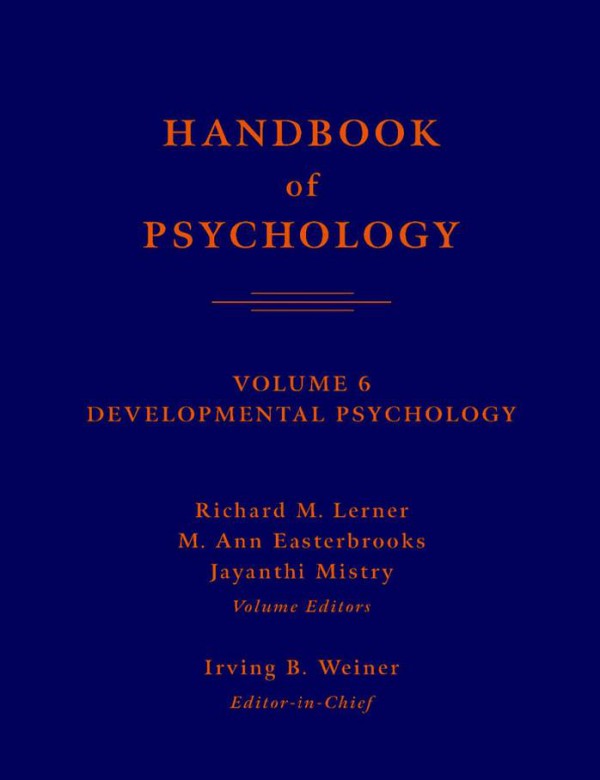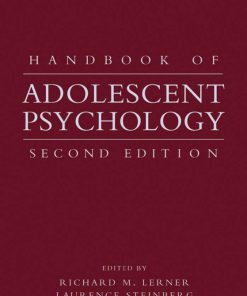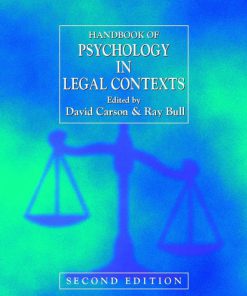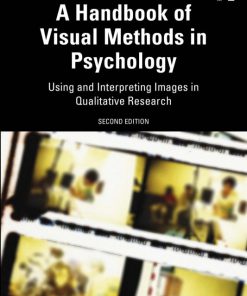Handbook of psychology Volume 6 Developmental psychology 2nd Edition by Irving Weiner, Ann Easterbrooks, Jayanthi Mistry, Richard Lerner ISBN 9781118285374 1118285379
$50.00 Original price was: $50.00.$25.00Current price is: $25.00.
Authors:Handbook of psychology. Developmental psychology. Volume 6-Wiley (2003) , Series:Psychology [190] , Author sort:6-Wiley, Handbook of psychology. Developmental psychology. Volume , Published:Published:Feb 2007
Handbook of psychology Volume 6 Developmental psychology 2nd Edition by Irving Weiner, Ann Easterbrooks, Jayanthi Mistry, Richard Lerner – Ebook PDF Instant Download/Delivery. 9781118285374 ,1118285379
Full download Handbook of psychology Volume 6 Developmental psychology 2nd Edition after payment
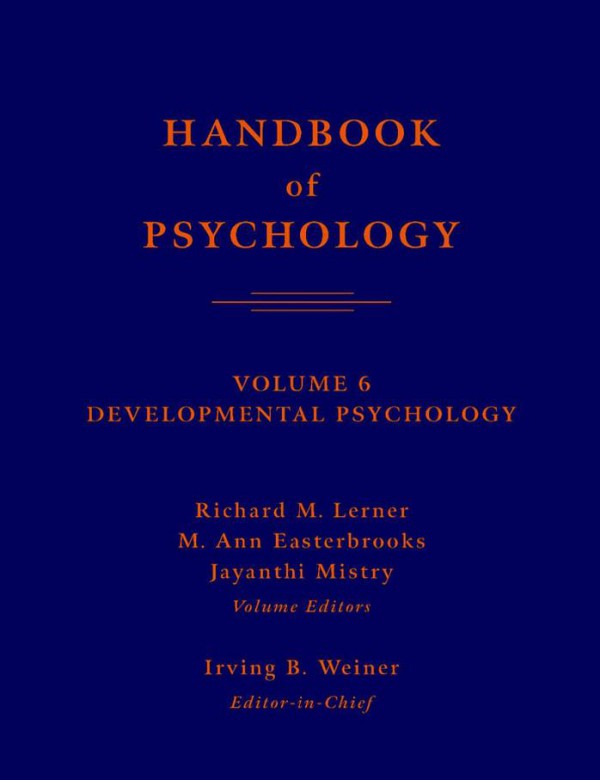
Product details:
ISBN 10: 1118285379
ISBN 13: 9781118285374
Author: Irving Weiner, Ann Easterbrooks, Jayanthi Mistry, Richard Lerner
Handbook of psychology Volume 6 Developmental psychology 2nd Edition Table of contents:
Part I Foundations of Development Across the Life Span
Chapter 1 Developmental Science Across the Life Span: An Introduction
A Brief History of the Life-Span Study of Human Development
The Plan of this Volume
Conclusions
References
Chapter 2 Metatheories, Theories, and Concepts in the Study of Development
Developmental Inquiry and the Metatheoretical
Transformation and Variation: A Relational Integration
A Brief History of Past Metatheoretical Worlds: Toward the Birth of Developmental Science
Relationism—A Contemporary Metatheory for Developmental Science
A Methodological Rapprochement: Explanation in a Relational Context
The Relational Developmental Systems’ Embodied Action (Enaction) Approach
Conclusions
References
Part II Infancy and Early Childhood
Chapter 3 Infant Perception and Cognition
Introduction
Methods for Studying Infant Perception and Cognition
Behavioral Methods
Current Topics in Infant Perception and Cognition
Attention
New Models of Infant Learning
Intersensory/Intermodal Processing
Face Processing
Object Perception
Causal Perception
Quantitative Processing
Categorization
Relation of Perception and Lower-Order Components to Higher-Order Cognition
Applications
Conclusions
References
Chapter 4 Social and Emotional Development in Infancy
Introduction
Socioemotional Development in Context
Developing Emotions and Sociability
The Growth of Meaning, Reciprocity, and Regulation in Emotional Development
Developments in Self and Social Understanding
Relationships: The Development of Attachments
Conclusions
References
Chapter 5 The Developmental Psychobiology of Stress and Emotion in Childhood
The Psychobiology of Stress
Psychobiological Studies of Stress and Emotion in Children
Conclusions
References
Chapter 6 Parent-Infant Communicative Interactions in Cultural Context
Introduction
Starting Principles
The Settings and Activities of Development
Modes of Communication
Communicative Accommodation
The Content of Language
Conclusions
References
Part III Childhood
Chapter 7 Language Development
Overview of Theoretical Approaches
Language Development as a Biological Process
Language Development as a Linguistic Process
Language Development as a Social Process
Language Development as Domain-General Learning
Conclusions
References
Chapter 8 Cognitive Development in Childhood: A Contemporary Perspective
Three Revolutions
Cognitive Development as a Separate Field
Main Features of the Piagetian System
Problems with Piaget’s Theory and Efforts to Respond to Them
Contemporary Trends
Future Directions in Cognitive Developmental Theory and Research
Conclusions
References
Chapter 9 Emotion and Personality Development
Introduction
Normal and Abnormal Emotional and Personality Development: A Developmental Psychopathology Perspecti
Individual Development of Emotion and Personality
Temperament and Personality
Relational Influences on Emotional and Personality Development
Parent–Child Relationships
Marital Relationships
Familywide Perspective
Cultural, Community, and Political Contexts
Normal and Abnormal Emotional and Personality Development: A Developmental Psychopathology Perspecti
Conclusions
References
Chapter 10 Social Development and Social Relationships in Middle Childhood
Social Development and Social Relationships in Middle Childhood
Introduction
Foundations of Social Development
Socialization Processes and Social Relationships
Social Relationships and Social Development: A Domain Approach
Socialization by Parents
Socialization by Peers
Socialization by Siblings
Conclusions
References
Chapter 11 Culture and Child Development
Introduction
Interface Between Culture and Child Development
Culture and Development as Mutually Constitutive
Conclusions
References
Part IV Adolescence
Chapter 12 Puberty: Its Role In Development
Historical Perspective
Puberty: A Brain-Neuroendocrine Event
Timing of Puberty: Its Psychological Significance
Does Pubertal Status or Timing Make a Difference in Psychological Development?
Family Influences on Timing of Puberty and Menarche
Mechanisms Involved in Timing of Puberty and Adjustment
Puberty and Obesity
Puberty and Bone Health
Puberty and Sleep
What Do We Know for Sure About Puberty and Development?
Conclusions
References
Chapter 13 Schools as Developmental Contexts During Adolescence
Level 1: Teachers, Tasks, and Classroom Environments
Level 2: Broader Schoolwide Characteristics
Level 3: District-Wide Policies
Conclusions
References
Chapter 14 Identity Development, Personality, and Well-Being in Adolescence and Emerging Adulthood:
The Transition to Adulthood and the Concept of Emerging Adulthood
Dimensions of Identity: Personal and Cultural
Personal Identity Development in Adolescence and Emerging Adulthood: Early Conceptualizations
The Development of the Big Five Dispositions from Childhood to Adulthood
The Role of Agency in Personal Identity Development
Cultural Identity in Adolescence and Emerging Adulthood
The Intersection of Personal and Cultural Identity in Adolescence and Emerging Adulthood
Areas in Need of Further Research
Conclusions
References
Chapter 15 Positive Youth Development: Processes, Philosophies, and Programs
PYD as a Developmental Process
The Study of Adolescence Within the Relational Developmental System
Approaches to PYD as a Developmental Process
Richard M. Lerner, Jacqueline V. Lerner, and Colleagues and the Study of Individual ? ? Context Rela
PYD as a Philosophy or Approach to Youth Programming
PYD as Instances of Youth Programs and Organizations
Problems in Integrating the Three Facets of PYD Scholarship
The Integration of Preventive and Promotive Approaches to Youth Development
Conclusions
References
Chapter 16 Adolescents, Parents, Friends/Peers: A Relationships Model
Introduction
Adolescents
Parents
Adolescent-Parent Relationships
Friends/Peers
A Typology of Triadic Relations
Future Directions
Conclusions
References
Part V Adulthood and Aging
Chapter 17 Disease, Health, and Aging in the First Decade of the 21st Century
Demographic and Public Health Considerations
Incremental Findings from Review Chapters
Understanding Risk and Predictions of Cognitive and Functional Declines
Medical Self-Management and New Models of Care
End of Life Issues
Predictions for the Future and the Role of Developmental Psychology
Conclusions
References
Chapter 18 Cognitive Development in Adulthood and Aging
Overview of Cognitive Aging: Approaches, Perspectives, and Processes
Intelligence and Memory: Classic Clusters of Processes
Biological and Health Influences on Cognitive Aging
Emotional and Affective Influences on Cognitive Aging
Potential for Sustained Cognitive Health in Aging
Conclusions
References
Chapter 19 Personality Development in Adulthood and Old Age
Historical Background
Theoretical Perspectives on Personality
The Self
Conclusions
References
Chapter 20 Social Relationships and Aging
Life Span and Life Course Theoretical Perspectives
Theoretical Perspectives About Social Relations
Developments in the Science of Social Relations
The Convoy Model as Illustrative of Theoretical Developments
Mechanisms and Contexts
Conclusions
References
Part VI Applied Developmental Psychology Across the Life Span
Chapter 21 Applied Developmental Science: Contributions and Challenges for the 21st Century
Applied Development Science: Yesterday and Today
Applied Developmental Science and Intraindividual Continuity and Change: Fostering Links Among Theor
Applied Developmental Science: Multilevel Dynamics in Prevention Research and Practice
Applied Developmental Science, Social Justice, and Sociopolitical Well-being
An Applied Developmental Science for the 21st Century
Conclusion: The Future of Applied Developmental Science
References
Chapter 22 Disabilities and Development
Disabilities and Development
Perspectives on Disability
Children’s Development Within the Family Network
Parents’ Adaptation and Well-Being
Future Directions
Conclusions
References
Chapter 23 Child Development and the Law
Child Development and the Law
Protecting the Children of Divorce
Children as Victims/Witnesses in Legal Settings
Children as Suspects/Offenders in Legal Settings
Conclusions
References
Chapter 24 Health and Human Development
Health and Human Development
A Developmental Systems Perspective of Human Development and Health
Changing Conceptions of Health
Positive Psychology and Health
Contextual Assets/Affordances That Promote Health and Positive Development
Individual and Contextual Strengths and Assets in Perspective
Methodological Considerations
Conclusions
References
Chapter 25 Successful Aging
Characteristics of Old Age
Successful Aging-Definition and Criteria
Processes Related to Successful Aging
Models of Successful Aging
Conclusions
References
Chapter 26 Developmental Technologies: Technology and Human Development
An Overview
Positive Technological Development
Choices of Conduct in Digital Communities
Conclusions
References
Author Index
Subject Index
People also search for Handbook of psychology Volume 6 Developmental psychology 2nd Edition:
journal of applied developmental psychology
father of developmental psychology
father of developmental psychology
in developmental psychology there is an increasing interest
You may also like…
eBook PDF
A Handbook of Visual Methods in Psychology 2nd edition by Paula Reavey 9781138491809 1138491802

